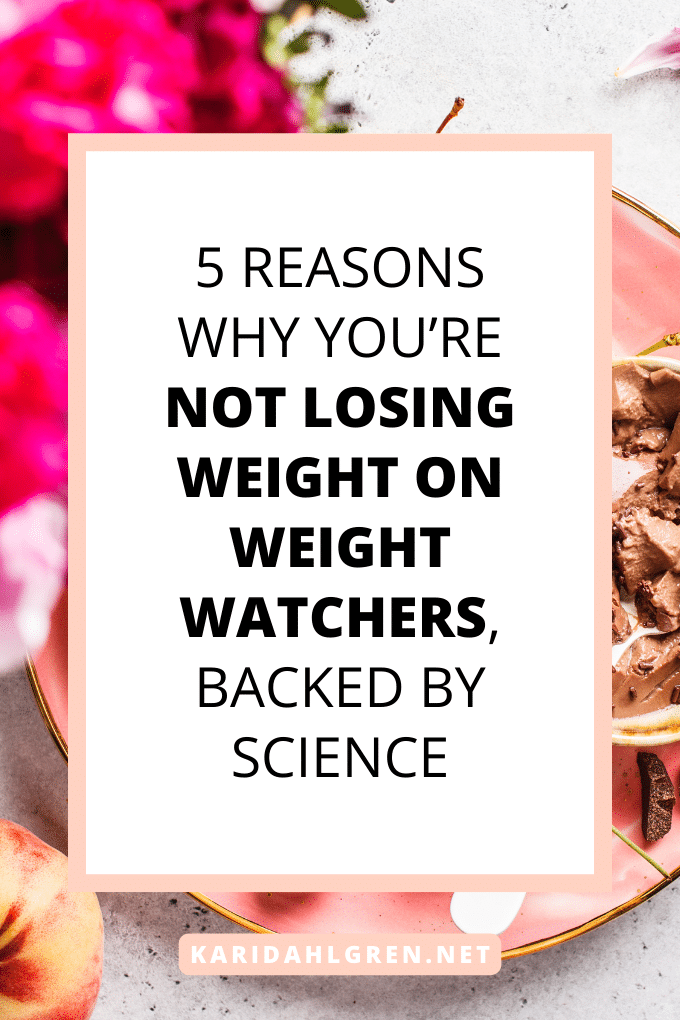
Are you feeling frustrated by your weight loss journey with Weight Watchers? I’ve personally worked with many clients that were not losing weight on WW and I have seen through their stories how exhausting it can be.
By the time people discover my work with eating psychology, they are absolutely fed up with dieting, and for good reason. Weight Watchers, even with its new updated Points system, is not a good fit for everyone. Clinical evidence has shown that restrictive diets don’t work long-term—and no matter how “flexible” Weight Watchers claims to be, it’s still restrictive when you have to stay within a point system.
Nevertheless, Weight Watchers is the largest weight loss support group in the world.[1] Their marketing dollars make success stories look both inspiring and doable. However, not everyone experiences success—particularly long-term.
If you’re not losing weight on Weight Watchers, you’re about to discover evidence-based reasons why along with alternatives for stopping compulsive eating without counting Points ever again.
Clinical Evidence For and Against the Efficacy of Weight Watchers
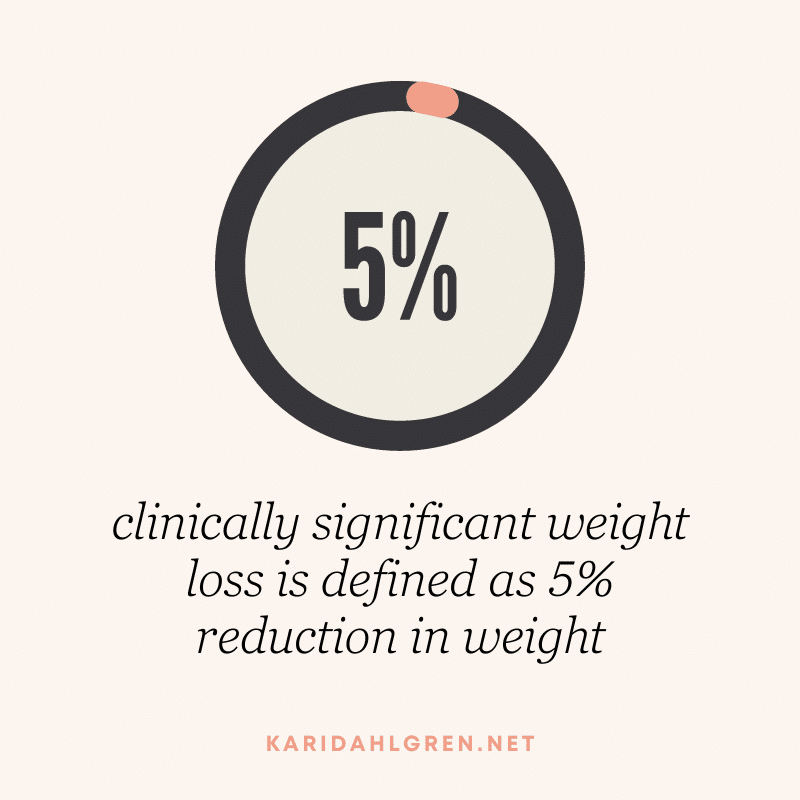
I researched this topic thoroughly using my background as a fact-checking medical writer who spent 9 years reviewing clinical studies side-by-side with clinicians. After scouring as many studies as I could find, I did not find any clinical studies linking Weight Watchers with clinically significant, long-term weight loss—where “clinically significant” is defined as a 5% reduction in weight.[2]
First, many WW studies follow participants short-term, often for just 12 weeks. One study found clinically significant weight loss with WW but only over a 12-week period without any follow-up. The study even goes on to state that:
“Twelve weeks is a relatively short duration for a weight management programme... Research suggests that in many cases the weight lost during behavioural and pharmacological treatments is regained after treatment cessation.”[3]
An abundance of clinical evidence shows that weight is often regained after restriction-induced weight loss.[4], [5], [6] One study even shows that one third of people regain even more weight than they initially lost.[7] Furthermore, one long-term study on Weight Watchers specifically says that after 2 years, weight lost with WW “is partially regained over time.”[8]
Is the key word here ‘partially’? If weight is only partially regained, there is still weight loss, right? Other evidence isn’t so compelling.
No Clinically Significant Long-Term Weight Loss with Weight Watchers

A randomized, controlled trial found that Weight Watchers led to “a loss of 3.2% of initial weight at 2 years.”[9] While this may sound impressive, let’s break it down. If an individual weighs 200 pounds at baseline—which is beautiful and, more importantly, can be healthy—then 3.2% weight loss is a mere 6.4 pounds. Is it worth tracking Points for “every lick, bite, and taste” just to lose six pounds over two years?
Plus, an enormous body of clinical evidence shows that dieting actually increases your “set point weight”—the weight your body naturally settles upon when you aren’t dieting.[10], [11], [12], [13], [14] This builds a strong, case for the probability that, even if you lose 6 pounds with restrictive point-counting on Weight Watchers, you’re likely to regain it.
If you’re not losing weight on Weight Watchers, this might reflect a broader scientific consensus: the program often results in short-term weight loss followed by clinically insignificant weight loss long-term that may or may not be sustained.
Finally, the official WW website says:
"People following the PointsPlus program can expect to lose between .5 and 2 pounds per week. But for some—especially those closer to goal—it can be at the bottom of that range, if not a little below it. Give it time. Even .2 of a pound per week adds up to more than 10 pounds in a year.”
Official ww website
These statistics are not reflective of actual clinical evidence. Furthermore, in my opinion, tracking every single thing you eat for an entire year just to lose 10 pounds – maybe – is a big ask with little return.
Super juicy update: On January 2, 2024, I was reviewing this article to make sure it's up to date. I clicked through to the WW website, and they have since taken this quote down!
Fortunately, I managed to dig up that old article and log it in the Wayback machine so that you know exactly where it came from. While I appreciate that my critical opinion here has been noticed, it's disappointing that WW has merely covered their tracks instead of changing their language.
Why Am I Not Losing Weight on WW? Exploring Your Options
By now I hope you’re starting to see why it’s normal if you’re not losing weight on Weight Watchers. The evidence just isn’t there. Fortunately, you don’t need to keep counting Points in order to maybe lose weight. When you turn your focus to the psychology of weight loss, you’ll be able to address the underlying reasons why you do the things you do around food.
Once we dig through these common and compelling reasons for not losing weight on Weight Watchers, I’ll provide tips for redirecting your focus towards your psychology instead.
Issue 1: Tracking Leads to Stress, and Stress Is Not Conducive to Weight Loss
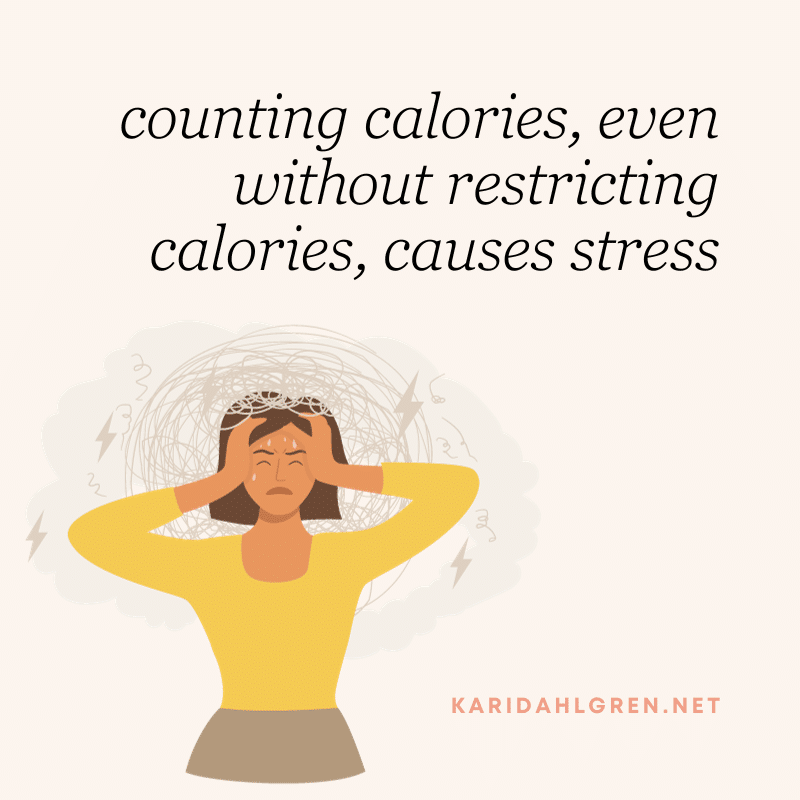
While tracking can be helpful for developing awareness of the foods you eat, it can also have a damaging psychological impact when the focus is placed on calories (and Points are based on calories). One reputable study found that the act of counting calories—not restricting calories, just counting them—increased stress.[15]
Stress is not conducive to weight loss. Clinical studies have found a link between excessive abdominal fat and a predisposition towards stress in challenging situations.[16] Body fat is, in its most basic definition, stored energy; and when your body perceives stress, it does not want to release energy reserves that it might need. If counting WW Points stresses you out, then for the sake of weight loss, a non-counting, non-restrictive approach may work best.
Issue 2: Weight Watchers (and Any Restrictive Diet) Goes Against “Set Point Weight Theory”
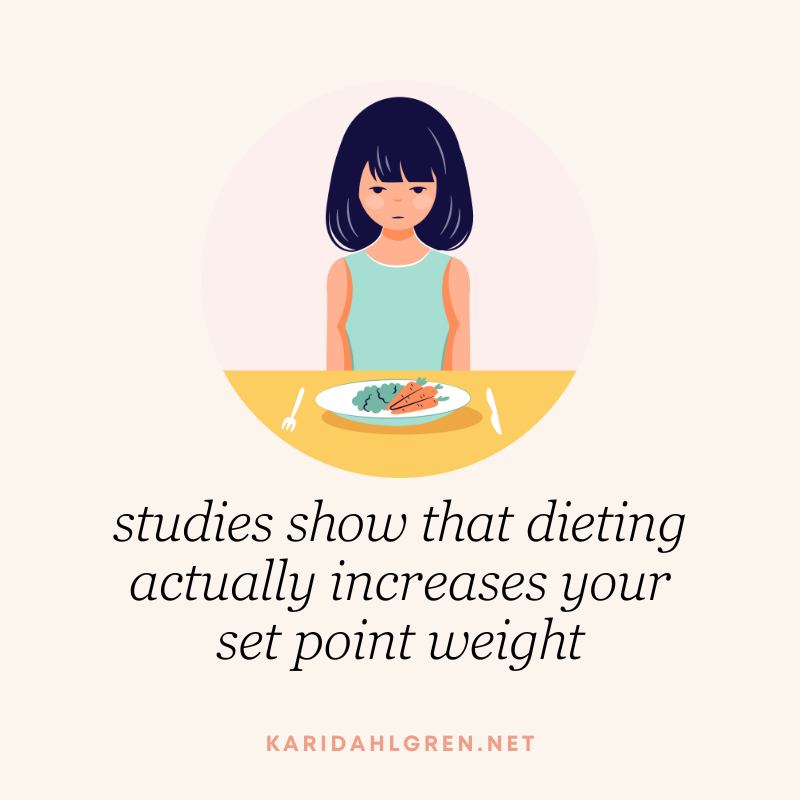
If you’re looking for a science-backed explanation for why you’re not losing weight on Weight Watchers, I highly recommend the book Health at Every Size by Linda Bacon. It digs into the compelling science behind set point weight theory, which illustrates how the human body is wired to resist weight loss through restrictive dieting.
(While I don’t agree with Linda’s advice on how to deal with emotional eating, she does an excellent job of scientifically backing set point weight theory through hundreds of clinical studies.)
In relation to not losing weight on Weight Watchers, Health at Every Size discusses why many of us regain the weight we lose after a diet: dieting actually increases your set point weight.[10], [11], [12], [13], [14] This can explain why some people regain even more weight than they initially lost while dieting.[7]
I am a fan of set point weight theory because it can provide some peace of mind around giving up dieting altogether. Many people (myself included many years ago) are afraid of gaining weight without dieting, but the enormous body of clinical evidence around set point weight theory builds a case for the opposite: dieting is what actually leads to weight gain, not the other way around. In fact, studies have found that intuitive eaters have more stable weight than dieters.[17]
Issue 3: Avoidance of High-Point Foods Can Push People to Overconsume Zero-Point Foods
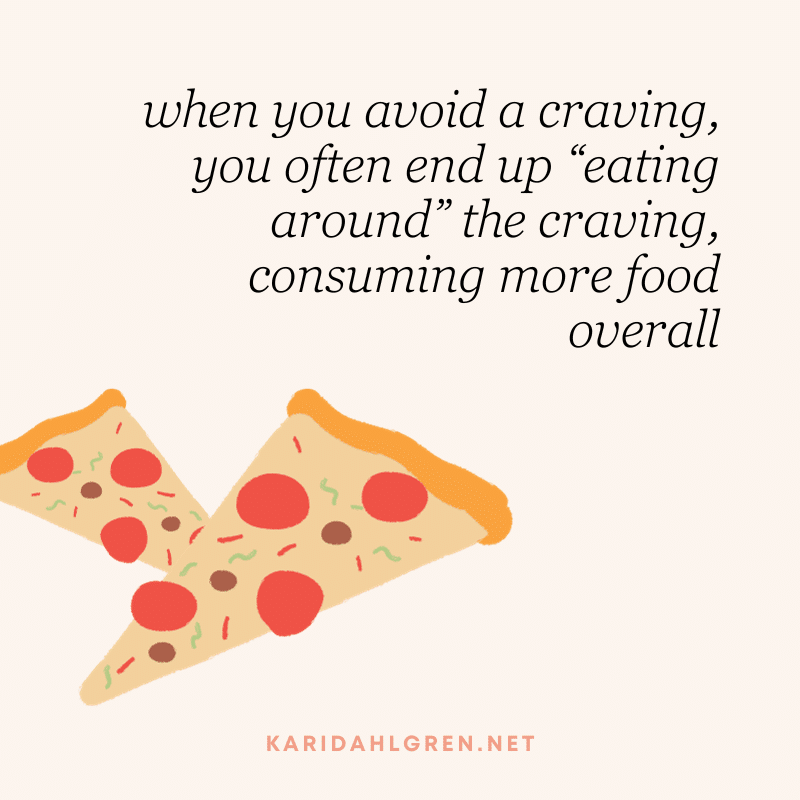
When you restrict your diet and eat less food than your body needs (which is, at its core, how Weight Watchers works) the body responds by increasing the desire for hyper-palatable foods, which includes foods high in carbs, fat, salt, or sugar.[18]
The more we restrict, the more we are biologically wired to crave hyperpalatable foods like desserts and indulgent meals—which are often high point foods. Then, when these delicious foods are placed off-limits, you begin to think about food even more. Clinical evidence backs this up: when foods are placed off-limits, we become more preoccupied with them and more likely to binge.[19], [20], [21]
Sometimes in an effort to avoid eating “high point” foods, people may opt for zeropoint foods instead. Still, overconsumption of zeropoint foods can become a loophole and may explain why someone is not losing weight on WW.
Issue 4: WW Does Not Address Emotional Eating
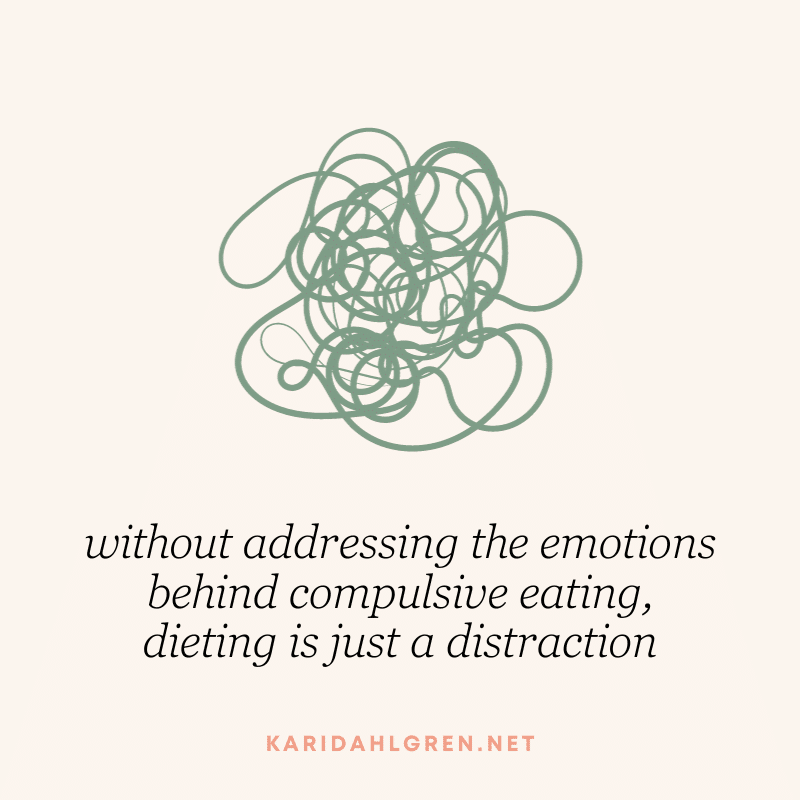
In my experience overcoming compulsive eating and seven years of coaching others through the same, the desire to eat past hunger is often emotional. Self-sabotage around food doesn’t happen for lack of knowledge because many people know what they want to be doing (eating healthy) yet they compulsively do the opposite of their goals.
The subconscious motivation behind the compulsion could be the desire to avoid an uncomfortable emotion like stress, loneliness, or anxiety or to gain a positive emotion like the pleasure of hyperpalatable foods. By solely focusing on counting Points based on the caloric and nutritional content of food, Weight Watchers overlooks the psychological reasons for overeating.
Does this mean that so-called psychology-based diet programs like Noom are better? No, because they still place limits on food, which predisposes you to binge on those foods[21]—and it neglects the emotions that drive compulsive eating.
Want to try something different from WW? Take my quiz to discover your eating psychology STRENGTH. Discover a much better place to focus your attention (rather than counting Points and getting nowhere). Click here to take the quiz now.
Issue 5: Other Factors Can Interrupt Your Ability to Lose Weight
Finally, there are many other small factors that may or may not be affecting your ability to lose weight. If you’re not losing weight on Weight Watchers, consider these areas:
- Sleep: When sleep-deprived, the body produces more ghrelin, the hormone responsible for stimulating hunger, while reducing levels of leptin, the hormone that signals feelings of fullness.[22] This can cause you to feel hungrier than you actually are and eat beyond your allotted Points.
- Metabolism: If you aren’t eating enough, your metabolism can slow down and ruin your chances of weight loss. One study even said, “this metabolic adaptation may persist during weight maintenance and predispose to weight regain unless high levels of physical activity or caloric restriction are maintained.”[23] In other words, you’re likely to regain the weight you lose if you don’t keep counting and tracking Points.
- Gaining muscle: If you’re not losing weight on WW but your pants fit looser, you could be gaining muscle, which is denser than body fat.[24] This is one reason why BMI is a poor indicator of health, because an athlete can easily have a high BMI even at a healthy weight if they are very muscular.[25]
- Overexercising: I wanted to mention exercise because, in my coaching practice, I see some clients running themselves ragged with overexercising in the hopes of losing weight. But again: stress is not conducive to weight loss, and overexercising is stressful on the body and mind.[26]
As you can see, balance is the theme that emerges when you explore all possible reasons for not losing weight on WW. While Weight Watchers claims to be flexible and balanced, the evidence is clear: counting Points is stressful, sets you up to crave even more hyperpalatable foods than before, and ultimately leads to clinically insignificant weight loss at best and weight “overshoot” (regain) at worst.[26]
Exploring Alternatives for Weight Loss Without WW

If you’re frustrated by a lack of results with WW, perhaps it’s time to explore alternative ways of losing weight without dieting or counting Points ever again. Instead of perpetuating the restrict-binge cycle, let’s break free from traditional diets.
Dieting involves strict rules, calorie counting, and food restrictions, which can lead to feelings of deprivation and ultimately result in overeating. By seeking an alternative, intuitive approach, you can establish a healthier relationship with food, which can lead to a more stable weight.
Here are some steps to help heal your relationship with food, adopt more intuitive eating habits, and break the cycle of frustration with Weight Watchers:
- Allow All Foods: Although WW promises that you can still eat the foods you love, one scrumptious dessert will usually cost all the Points you have allotted for the entire day. When you remove restrictions around certain foods, you decrease preoccupation with them and reduce the psychological desire to want what you can’t have.
- Stop Dieting Behaviors that Create Stress: Your body is not wired to release weight under stress. Opt for the least stressful way of eating for the best weight loss results. For some people, this involves intuitive eating; for others, it means slowly breaking away from point-counting and calorie-counting. Do what’s best for you.
- Remember That Restrictive Dieting Increases Your Set Point Weight: If you are afraid of giving up the food rules because of the fear of weight gain, you aren’t alone. This is a common fear—one that I felt myself when I was giving up dieting. What helped encourage me to take the leap is the clinically-backed evidence that dieting increases your set point weight; so I felt I didn’t have much to lose by giving it up—besides maybe some weight.
- Practice Listening to Your Natural Hunger and Fullness: Long-term point-tracking with WW can diminish your connection with your natural hunger and fullness signals as you become trained to focus on Points instead of physical hunger and fullness cues. It’s normal to feel unsure about what hunger actually feels like after giving up dieting, so be patient as you get back in touch with those cues.
- Heal Your Metabolism: If you’ve been restricting your diet for many years, it’s likely that your metabolism has slowed down too. You can work on healing your metabolism by gently reintroducing foods back into your diet, eating when you’re hungry, and stopping when you’re full.
- Practice the Stop, Drop, & Feel to Stop Emotional Eating: Stopping when you’re full is often the hardest part, and that’s where my Stop, Drop, & Feel technique comes into play. It’s a powerful tool to stop overeating by addressing the hidden emotions behind compulsive eating.
What to Do When You’re Not Losing Weight on WW
Many individuals struggle with not losing weight on WW, and the reality is that Weight Watchers, like many other diets, does not lead to clinically significant weight loss, especially in the long-term. The body is wired to conserve energy when calories are restricted, which means WW quickly becomes counterproductive.
If you want to address the psychology of eating instead, check out my free ebook below. It comes with a free mini course on Psycho-Spiritual Wellness, my approach to stopping compulsive eating rooted in psychology and spirituality. It’s much better than WW, in my opinion! I invite you to decide for yourself.




Great article… as always,
Thank you Christa!
I so agree! I’ve done WW at least three times…and will not pay for that again. I’m learning that weight loss is a lot more than calorie counting. Great article.
Thank you Mary Ann! It’s so understandable to have been through it a few times. They do such a great job of making it sound like a great idea. I’m glad to have you here 🙂
Dear Kari,
You and your tools have ignited a hope I have not felt in a very long time. Thank you.
I am 62 and have been obese since age 12. I reached an all time high weight of 351 pounds. After starting on Ozempic for adult onset diabetes I lost 20 pounds but then the benefit of the medication faded. At about that time I also experienced a medical emergency when I became septic. Interestingly for the first time in my life I had no real interest in food and ended up losing an additional 30 pounds. When I weighed less than 300 pounds I promised to never go over 300 pounds ever again. I have not exceeded 300 by more than 3 pounds and have maintained the weight lost for over 2 years. Something I am very proud of and honestly shocked I have done.
What frustrates me is why I have not succeeded in losing more. I am not unrealistic and do not aim to weigh 180 pounds but I deserve to drop another 50-75 pounds so I am not hovering so close to 300 and will be healthier and move easier. It’s time to release myself from this muck and move toward a healthier me.
Your words, and your quote by Geneen Roth confirms that your information aligns with the information I received from an awesome therapist a long time ago. Unfortunately she left the area but her influence echos in my head often and I am hopeful your methods, your words, your tools will move me forward, back in line with Vicky’s teachings that have been instrumental in my psychological healing.
I do not know if you watched the tv special last evening hosted by Oprah? I did not, but heard she did a wonderful job at enlightening the masses that obesity is “a disease – not a character flaw.”
MY enlightenment came when one of my dearest, long-term friends, shared the above quote with me…indicating this was a new revelation to her.
I cried for hours wondering if those closest to me, the very people who love me as I am, struggle with why I have not lost the weight because “it’s just about eating less and exercising more” right??
Is there a question that I CHOOSE to be morbidly obese? I am not negating my responsibility in my size, as there is no one else putting food in my mouth, but I expected those closest to me to have some clue about the complexity of eating disorders. I now realize that if asked they would likely not consider “compulsive overeating” as an “eating disorder”.
Complicating factors include limited physical activity resulting from pinched nerves in my back due to spinal stenosis limiting my ability to stand for 2-3 minutes and/or walking about 100 feet before needing to sit to relieve the pain.
Gratefully I do not have pain when seated or lying down. I know what a blessing this is. Unfortunately it is much easier to stay seated than to move, when moving requires much effort and results in pain. My knees are also both bone on bone but I cannot have them replaced. I have researched and found chair exercises that I simply need to commit to and remember to complete when I am up.
It feels good to be able to share my thoughts. I am excited to learn and reignite the need to stop dieting. As Vicky once quoted (possibly from Geneen Roth) “For every diet there is an equal and opposite binge.” So true!
Have a wonderful day! Sue
Hi Sue! I am so grateful that you took the time to share your story with me and with anyone else reading this post. Your story is powerful, and I think many of us can relate to that moment of tears, wondering what others think because it’s about “just eating less” right?? — except it isn’t. Telling someone that struggles with compulsive eating to “just stop eating” is like telling a smoker to “just stop smoking.” It doesn’t work like that, and I am so glad that you’ve found inspiring sources like your old therapist, Geneen Roth, and yours truly, who can all remind you of your worthiness. I count myself lucky to have you in my little corner of the internet, and I look forward to hearing future updates! I also couldn’t help but notice that you picked up a copy of my book and workbook, and I thank you kindly for supporting my work. I am also in your corner now, here to cheer you on!
I love the way you break down these concepts & show the science!! Thank you for this awesome deep dive
Thank you Elizabeth! It’s always so nice to hear from you! 🙂
I joined WW and lost a pretty good amount of weight. But, I HATED measuring food and counting every point. HATED IT. I went to meetings and the culture seemed unhealthy. For example, one meeting leader talked about how she ate canned green beans for every meal during an entire week to “save” enough points for a special dinner. I think I finally gave up when I was very proud because I recently ran a half marathon. At the WW weigh-in the next week, I had gained 2 pounds and the weigh-in lady gave me a very stern look and shook her finger at me while mouthing “you gained 2 pounds”. I would rather feel proud of my body than count points and I never went back to WW after that. Think I may have rebelled by stopping at DD right after that meeting. I still struggle with overeating, especially emotional eating, but not going back to counting points, never.
Oh man Jeannine, is your story relatable or what! Ugh, the shame that woman was inflicting, that is despicable. I’m sorry you had to go through that. And I’m so glad that you decided to quit dieting in favor of your mental health. Not counting points ever again is certainly a milestone to celebrate!! Thanks for sharing your story 🙂
I’m just starting my intuitive eating journey after countless diets and programs that promised weight loss, and then left me feeling like my failure to lose the weight I’d hoped to was due to some character flaw in me – lack of willpower or discipline. I’m learning to forgive myself for all the diet hell I’ve put my body and mind through and I’m determined to practice working with my body instead of against it. I’m working with a therapist on healing trauma and a dietician on healing my relationship with food. Your content is such a help in supporting this for me. Thank you
What an amazing support system you have Lucy! What a powerful form of self-care. I applaud you for kicking diet culture to the curb, and your new mindset makes me smile 🙂 self-kindness just leaps off the page, and that is a hard-won skill, because diet culture certainly didn’t teach us self-kindness. Thanks for sharing your story with me and anyone else reading this post.
Thank you for your advice.
I only have 4 kg to lose to get to goal but keep cheating and gaining and losing weight! I’m on a similar program to WW, but I need to weigh my food. Very frustrating! I’m 67 and I’ve struggled with my weight all my life. Last year I weighed 79 kg and I’m only 5.2 in.
I look forward to your free ebook and free course. Thank you so much.
Hi Maria! Thank you for taking the time to share your story. I think so many of us can relate to what you are going through. The up/down yo-yo pattern of dieting is exhausting and demoralizing. I wish freedom for you around food! And I am so glad you’re signed up to get the ebook and free lessons. I hope they help support you on your journey towards feeing normal around food again. You can reply to any of those emails to reach me directly, and I would love to hear how things go. I am in your corner, rooting for you 🙂
Oh, my goodness Kari,
Thanks so much for this post! I’ve been stressed out over a job that has taken over my life (and I will be leaving in the next two weeks, thankfully!) and slipping back into that ole’ stinking thinking, especially since the doctor said I need to lose weight. I nearly drank the Kool-Aid and was seriously thinking about returning to WW. Providentially, I’d been catching up with your emails and was reading the one about my personal faves, too, Geneen Roth quotes. This led me to revisit the WW and why it doesn’t work. Well, your wonderful, wise words snapped me right out of that fog and reminded me that this is so not the way to go. This is a lesson to me that periods of great stress require more SDF and not WW! Thank you always for your consistency. You just saved me loads of more stress, and serious damage to my soul. Blessings! Dolores
Hi Dolores!! I’m so glad you came across this article at the right time. It sounds like it was just what you needed! Indeed, anytime we contemplate dieting, we deserve to give ourselves enormous self-compassion. It’s such a normal response to feeling stressed or otherwise out of control. The desire is always well-meaning, and to be able to recognize it and choose a path of kindness instead of restriction, that is true empowerment 🙂
Hi Kari, I’ve recently found your website and videos. They have been super helpful to me and I have a few things in my inbox on my list like the work book. I was curious to hear your thoughts on a new WW plan that doesn’t have points, it just focuses on protein, water, and fruit/vegetables goals. It’s more working up to nutrition than counting down to be in deficit and out of points. I still see the stress from keeping track. As someone who has been struggling with BED for few years, I got rid of my scale and am trying to eat intuitively. Would you recommend setting some nutritional goals to strive for during the day or would that too be “diet” ? I appreciate any thoughts. Thanks!
Hi Jessica! Thank you so much for supporting my work 🙂 and I am SO happy you asked this question! It’s a really good question that no doubt others have wondered. And I do have to start with the boilerplate answer, because it’s obnoxiously true: the answer to this is different for everyone. Some people might be able to set nutrition goals right off the bat and it won’t trigger rebellious behaviors, and for other people it might backfire. It all depends. I wonder if the best path forward is to focus on curiosity and the Stop, Drop, & Feel. How does curiosity feel over restriction? And how does the SDF go? These will be very helpful questions going forward. At some point, we can all work towards nutrition goals without triggering rebellious behavior, but we need emotional tolerance under our belt, and that’s what the SDF is for. I hope this helps 🙂 you can reply to any of my emails to reach me directly, too! Thanks again for supporting my work. I am in your corner, cheering you on!